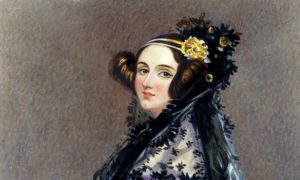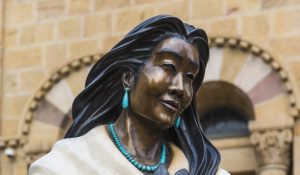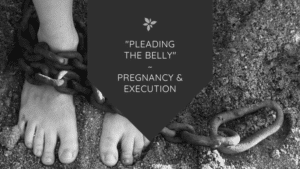Nana Asma’u (1793-1863) was a princess, poet, and teacher, and is considered the precursor to modern feminism in Africa. She had such an impact of the education of women, that in Nigeria today, many Islamic women’s organisations, schools, and meeting halls are named after her.
Nana was a member of the Fodio clan who ruled the Sokoto Caliphate in modern-day Nigeria. Her family was part of a fundamental Islamic sect, known as the Qadiriyya, who focused on the pursuit of knowledge as a spiritual path.
She had an excellent education from a young age. She learned all the Islamic classics, memorized the entire Qur’an, and was fluent in four languages: Arabic, the Fula language, Hausa and Tamacheq Tuareg. She wrote poetry in the first three, and became well-known in her time for her poems. She was an accomplished author and respected scholar in communication with scholars throughout the sub-Saharan African Muslim world.
Her poetry addressed topics like divine truth, Sufi women saints, Muhammed, and jihad battles. She also wrote eulogies that today serve as historical documents providing insight into the turbulent political atmosphere at the time. Much of her poetry placed a strong emphasis on women leaders and rights of women within the community ideals of the Sunnah and Islamic law.
Like other women in her family, Nana Asma’u taught both boys and girls together. However, in addition to teaching local students, she made an impact on Muslim women’s education by training a large network of women as educators. The women memorized Nana’s poetry as teaching devices to use in instructing Islamic women. The group of women, called yan-taru, or “those who congregate together, the sisterhood”, traveled throughout the Caliphate educating women, who passed on their education to others.
Today, Nana Asma’u’s works still inspire Muslim women all over the world. Her life and works are a testimony to a women’s right to pursue education and to be active in pursuing social issues. Her tomb in Sokoto is a place of pilgrimage for Muslims.
See Also: Huda Shaarawi, Egyptian feminist & activist
Image of Sufi women in west Africa (“Seyda Zeynabu Mbaj during Hadrah”) by nebedaay on flickr.
Keri is a blogger and digital marketing professional who founded Amazing Women In History in 2011.




What an amazing woman! Can you please direct me to her writings?
Thank you for this post.
Just a comment, the Qadriyaa are not a fundamental movement, the term itself is problematic, especially as you have not given it a definition. They are a sufi order that has been present in West Africa since the 16th century. She was the daughter of the first caliph and the brother of the second, they did not establish a kingship so she was not a princess either!
Jean Boyd’s book is probably the best work on her, Nana Asamu’ the Caliph’s sister. You may have a hard time getting your hands on it however.
I would be glad if I could read her poems in English renderin.